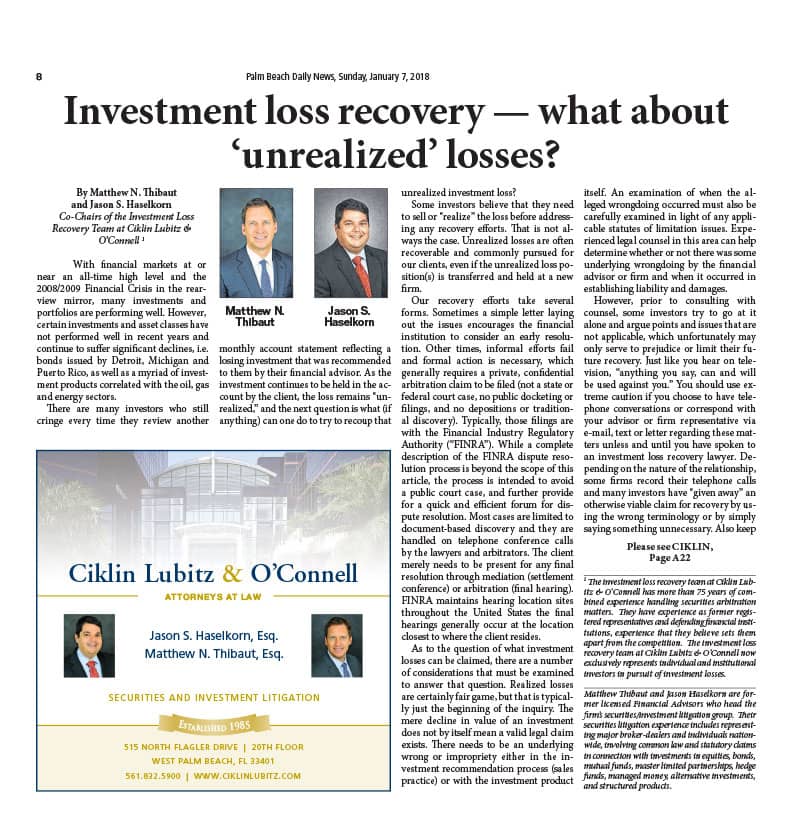Published in the Palm Beach Daily News on January 7, 2018
With financial markets at or near an all-time high level and the 2008/2009 Financial Crisis in the rear-view mirror, many investments and portfolios are performing well. However, certain investments and asset classes have not performed well in recent years and continue to suffer significant declines, i.e. bonds issued by Detroit, Michigan and Puerto Rico, as well as a myriad of investment products correlated with the oil, gas and energy sectors.
There are many investors who still cringe every time they review another monthly account statement reflecting a losing investment that was recommended to them by their financial advisor. As the investment continues to be held in the account by the client, the loss remains unrealized, and the next question is what (if anything) can one do to try to recoup that unrealized investment loss
Some investors believe that they need to sell or realize the loss before addressing any recovery efforts. That is not always the case. Unrealized losses are often recoverable and commonly pursued for our clients, even if the unrealized loss position(s) is transferred and held at a new firm.
Our recovery efforts take several forms. Sometimes a simple letter laying out the issues encourages the financial institution to consider an early resolution. Other times, informal efforts fail and formal action is necessary, which generally requires a private, confidential arbitration claim to be filed (not a state or federal court case, no public docketing or filings, and no depositions or traditional discovery). Typically, those filings are with the Financial Industry Regulatory Authority (FINRA). While a complete description of the FINRA dispute resolution process is beyond the scope of this article, the process is intended to avoid a public court case, and further provide for a quick and efficient forum for dispute resolution. Most cases are limited to document-based discovery and they are handled on telephone conference calls by the lawyers and arbitrators. The client merely needs to be present for any final resolution through mediation (settlement conference) or arbitration (final hearing). FINRA maintains hearing location sites throughout the United States the final hearings generally occur at the location closest to where the client resides.
As to the question of what investment losses can be claimed, there are a number of considerations that must be examined to answer that question. Realized losses are certainly fair game, but that is typically just the beginning of the inquiry. The mere decline in value of an investment does not by itself mean a valid legal claim exists. There needs to be an underlying wrong or impropriety either in the investment recommendation process (sales practice) or with the investment product itself. An examination of when the alleged wrongdoing occurred must also be carefully examined in light of any applicable statutes of limitation issues. Experienced legal counsel in this area can help determine whether or not there was some underlying wrongdoing by the financial advisor or firm and when it occurred in establishing liability and damages.
However, prior to consulting with counsel, some investors try to go at it alone and argue points and issues that are not applicable, which unfortunately may only serve to prejudice or limit their future recovery. Just like you hear on television, anything you say, can and will be used against you. You should use extreme caution if you choose to have telephone conversations or correspond with your advisor or firm representative via e-mail, text or letter regarding these matters unless and until you have spoken to an investment loss recovery lawyer. Depending on the nature of the relationship, some firms record their telephone calls and many investors have given away an otherwise viable claim for recovery by using the wrong terminology or by simply saying something unnecessary. Also keep in mind that many firms encourage their financial advisors to document discussions with clients.
The above examples apply to recommendations of individual investments (stocks, bonds, mutual funds, master limited partnerships, exchange traded funds, unit investment trust, alternative investments and annuities) and investment managers, as well as overall investment strategies. Investment accounts are often some of the largest assets impacting a client’s estate plan, and the investment strategies, investment managers, investment products should all be carefully reviewed, especially if clients have significant realized or unrealized investment losses.
The investment fraud lawyers has more than 75 years of combined experience handling securities arbitration matters. They have experience as former registered representatives and defending financial institutions, experience that they believe sets them apart from the competition. The investment loss recovery team now exclusively represents individual and institutional investors in pursuit of investment losses.


